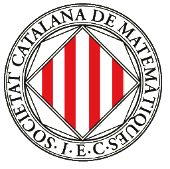Spiros Adams-Florou (Glasgow University)
Title: Simplicially graded algebraic topology.
Abstract: In algebraic topology there are many examples of local to global theorems where a global consequence is drawn from imposing strong local conditions. When working with simplicial complexes it is often possible to fragment a global geometric obstruction into a local obstruction over each simplex with a problem being soluble if and only if all the local obstructions vanish. An important example of this is the total surgery obstruction of Ranicki.
In this talk I will discuss the approach of fragmenting over a simplicial complex, give some examples of problems that can be solved with this approach and explain some potential applications to the algebraic theory of surgery.
Carles Broto (Universitat Autònoma de Barcelona)
Title: Automorphisms of fusion systems of finite groups of Lie type.
Abstract: Fix a prime p. Given a finite group G and a Sylow p-subgroup S of G, there are natural homomorphisms between Out(G), the group of homotopy classes of self-equivalences of the p-complete classifying space of G, and the fusion preserving automorphisms of $S$. We compare these groups in case of finite groups of Lie type. This is joint work with J. M. Møller and B. Oliver.
Imma Gálvez (Universat Politècnica de Catalunya)
Title: Decomposition spaces for homotopy algebraic combinatorics.
Abstract: Joint work with J Kock (UAB), A Tonks (Leicester).
In this talk I will explain the use of (infinity-)groupoids instead of sets in enumerative combinatorics, and homotopy equivalence instead of bijective correspondence between equinumerous objects. Groupoid slices, or equivalently presheaves (of groupoids) on a groupoid $G$, take the place of numerical functions from $\pi_0(G)\to\mathbb Q$. In particular, the process of taking the incidence coalgebra of a poset or monoid can be lifted: starting with a simplicial groupoid satisfying certain coassociativity conditions (in our terminology, a `decomposition space’) one can define an incidence coalgebra in the category of groupoids. Examples include generalisations of Hall (co)algebras, the Butcher–Connes–Kreimer coalgebra of trees, and a new notion of directed restriction species, generalising the restriction species of Schmitt.
Richard Hepworth (University of Aberdeen)
Title: Homological Stability for Families of Coxeter Groups.
Abstract: A series of groups and homomorphisms
G_0 -> G_1 -> G_2 …
is said to satisfy homological stability if in any fixed degree d the sequence of homology groups
H_d(BG_0) -> H_d(BG_1) -> H_d(BG_2) -> …
eventually consists of isomorphisms. Homological stability holds for symmetric groups, general linear groups, mapping class groups, and many many more. In almost all cases we do not know the homology groups themselves. In this talk I will explain a stability result for certain families of Coxeter groups. Examples include the A_n, BC_n and D_n families (all finite), the superideal simplex reflection groups (all hyperbolic), and many others.
Joan Porti (Universitat Autònoma de Barcelona)
Title: Coarse geometry of discrete subgroups of isometries of symmetric spaces.
Abstract: Among the discrete subgroups of isometries of hyperbolic space, convex cocompact groups play an important role, in particular in Thurston’s geometrization. Those subgroups are characterized in many ways. In this talk I discuss joint work with M Kapovich and B Leeb about generalizing this notion to higher rank symmetric spaces of non compact type.
Liam Watson (Glasgow University)
Title: Loops, L-spaces, and left-orderabiliy.
Abstract: I’ll give an overview of a project-in-progress with Jonathan Hanselman. We develop a calculus for studying the (bordered) Heegaard Floer homology of a particular class of orientable three-manifolds with torus boundary. This allows us to give a complete understanding of when gluing two such manifolds (to form a closed three-manifold) has simplest-possible Heegaard Floer homology — that is, when the resulting closed manifold is an L-space. As an application, we prove the following: For a graph manifold $Y$ which decomposes along a torus into two Seifert fibred pieces, $Y$ is an L-space if and only if $\pi_1(Y)$ is not a left-orderable group. This equivalence between L-spaces and non-left-orderable fundamental groups is conjectured to hold in general.

